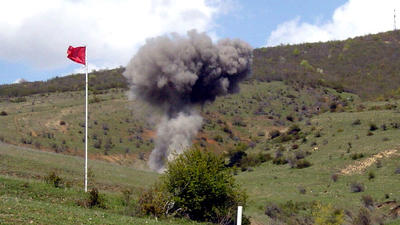-
Our work
-
Fields of work
- Arms control
- Border management
- Combating trafficking in human beings
- Conflict prevention and resolution
- Countering terrorism
- Cyber/ICT Security
- Democratization
- Economic activities
- Education
- Elections
- Environmental activities
- Gender equality
- Good governance
- Human rights
- Media freedom and development
- Migration
- National minority issues
- Policing
- Reform and co-operation in the security sector
- Roma and Sinti
- Rule of law
- Tolerance and non-discrimination
- Youth
- Field operations
- Projects
-
Meetings and conferences
- Summit meetings
- Review Conferences
- Ministerial Council meetings
- Plenary meetings of the Permanent Council
- Plenary Meetings of the Forum for Security Co-operation
- Security Review Conferences
- Annual Implementation Assessment Meetings
- Economic and Environmental Forum
- Economic and Environmental Dimension Implementation Meetings
- Human rights meetings
- Media conferences
- Cyber/ICT security conferences
- Conference of the Alliance against Trafficking in Persons
- Gender equality conferences
- Annual OSCE Mediterranean conferences
- Annual OSCE Asian conferences
- Partnerships
-
Fields of work
-
Countries
- All
-
Participating States
- Albania
- Andorra
- Armenia
- Austria
- Azerbaijan
- Belgium
- Belarus
- Bosnia and Herzegovina
- Bulgaria
- Canada
- Croatia
- Cyprus
- Czechia
- Denmark
- Estonia
- Finland
- France
- Georgia
- Germany
- Greece
- Holy See
- Hungary
- Iceland
- Ireland
- Italy
- Kazakhstan
- Kyrgyzstan
- Latvia
- Liechtenstein
- Lithuania
- Luxembourg
- Malta
- Moldova
- Monaco
- Mongolia
- Montenegro
- The Netherlands
- North Macedonia
- Norway
- Poland
- Portugal
- Romania
- Russian Federation
- San Marino
- Serbia
- Slovakia
- Slovenia
- Spain
- Sweden
- Switzerland – OSCE Chairpersonship 2026
- Tajikistan
- Türkiye
- Turkmenistan
- Ukraine
- United Kingdom
- United States of America
- Uzbekistan
- Asian Partners for Co-operation
- Mediterranean Partners for Co-operation
-
Structures and institutions
- Chairpersonship
-
Secretariat
- Secretary General
- Office of the Secretary General
- Conflict Prevention Centre
- Transnational Threats Department
- Office of the Special Representative and Co-ordinator for Combating Trafficking in Human Beings
- Office of the Co-ordinator of OSCE Economic and Environmental Activities
- Gender Issues Programme
- Opportunities for Youth
- Department of Human Resources
- Department of Management and Finance
- Office of Internal Oversight
- Documentation Centre in Prague
- Institutions
-
Field operations
- Presence in Albania
- Centre in Ashgabat
- Programme Office in Astana
- Programme Office in Bishkek
- Mission to Bosnia and Herzegovina
- Programme Office in Dushanbe
- Mission in Kosovo
- Mission to Moldova
- Mission to Montenegro
- Mission to Serbia
- Mission to Skopje
- Project Co-ordinator in Uzbekistan
- Closed field activities
- Parliamentary Assembly
- Court of Conciliation and Arbitration
- Organizational structure
- About us
Press release
OSCE Mission assists in handover of weapons and munitions in zone of Georgian-Ossetian conflict

- Date:
- Place:
- TBILISI
- Source:
- OSCE Mission to Georgia (closed)
- Fields of work:
- Arms control
TBILISI, 30 April 2004 - Russian engineers of the Joint Peacekeeping Force (JPKF) carried out on Thursday the destruction and demolition of weapons and munitions collected under the OSCE Mission to Georgia Rapid Reaction programme in the zone of the Georgian-Ossetian conflict.
Items destroyed included one 82 mm mortar, one 23 mm heavy machine gun, 24 firearms of various types, 66 anti-tank mines as well as ammunition, rockets and grenades. They had been handed over during the past 18 months. The destruction process was monitored by OSCE observers.
"This programme substantially diminishes the threats of accidental outbreak of violence caused by excessive amounts of munitions in general circulation in the zone of conflict," said Ambassador Roy Reeve, Head of the OSCE Mission to Georgia.
Under the Rapid Reaction programme, the OSCE provides financial assistance for community-oriented small projects. Based on ideas suggested by individuals, the projects aim at helping to improve the living and social conditions of communities within the zone of the Georgian-Ossetian conflict. The activities address the needs and concerns of the community.
The weapons were destroyed at the Russian Battalion of the JPKF, and the ammunition and explosives on a range near Tskhinvali. Observers present included Giorgi Khaindrava, Georgian State Minister for Conflict Resolution and Boris Chochiev, South Ossetian Co-Chairman of the Joint Control Commission for the settlement of the Georgian-Ossetian Conflict. Diplomatic representatives from the donor states of Italy and the UK were also present.
Items destroyed included one 82 mm mortar, one 23 mm heavy machine gun, 24 firearms of various types, 66 anti-tank mines as well as ammunition, rockets and grenades. They had been handed over during the past 18 months. The destruction process was monitored by OSCE observers.
"This programme substantially diminishes the threats of accidental outbreak of violence caused by excessive amounts of munitions in general circulation in the zone of conflict," said Ambassador Roy Reeve, Head of the OSCE Mission to Georgia.
Under the Rapid Reaction programme, the OSCE provides financial assistance for community-oriented small projects. Based on ideas suggested by individuals, the projects aim at helping to improve the living and social conditions of communities within the zone of the Georgian-Ossetian conflict. The activities address the needs and concerns of the community.
The weapons were destroyed at the Russian Battalion of the JPKF, and the ammunition and explosives on a range near Tskhinvali. Observers present included Giorgi Khaindrava, Georgian State Minister for Conflict Resolution and Boris Chochiev, South Ossetian Co-Chairman of the Joint Control Commission for the settlement of the Georgian-Ossetian Conflict. Diplomatic representatives from the donor states of Italy and the UK were also present.